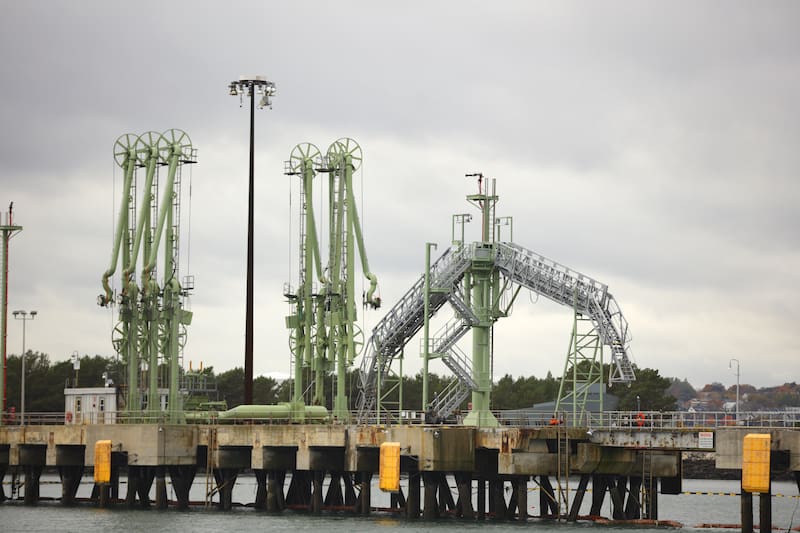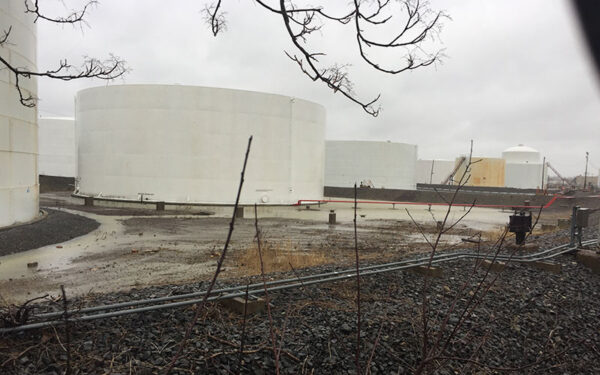
Oil pumps in South Portland, Maine. Photo: Shutterstock
Despite the urgent need to end our global addiction to climate-damaging fossil fuels, Big Oil is intent on extracting and exporting more and more of its outdated product. But local communities across the country and the world are standing up to say no.
South Portland, Maine, and Portland, Oregon, are just two of the most recent cities to take a stand. They may be on opposite sides of the country, but they both share a commitment to protecting the health, welfare, and safety of their communities. When the petroleum industry challenged ordinances passed by each city that limit new fossil-fuel infrastructure, the two Portlands held fast, despite an onslaught of money and pressure from Big Oil and its allies.
In separate decisions handed down in August, the courts concluded that both cities clearly had the right to act to protect their residents from the harms new fossil fuel infrastructure would bring. As such, both of the ordinances serve as models for communities on both coasts and everywhere in between who wish to protect their public health and quality of life.
The Clear Skies Ordinance: Protecting South Portland’s Public Health and Quality of Life
Here in New England, South Portland’s fight against Big Oil began five years ago.
At that time, a pipeline running from South Portland’s waterfront to Montréal had been used for decades to transport oil to Canada from tankers docked in Maine. Faced with a precipitous decline in the Canadian demand for imported oil, in 2013, Portland Pipe Line Corporation sought permission to reverse the flow of the 70-year-old pipeline (which is owned by ExxonMobil, Shell Oil, and Suncor). The goal: to meet Canada’s desire to export Alberta tar sands oil to international markets by bringing it from Montréal down to South Portland and out through Casco Bay.
Tar sands oil is the dirtiest fuel source on the planet. Extracting it not only requires huge quantities of water, it also creates enormous pools of toxic wastewater that can be seen from space. What’s more, the process is extremely energy intensive, making it the dirtiest and most carbon-intensive of all fossil fuels.
Transporting tar sands oil comes with its own risks. There have been a number of pipeline and rail car failures that have had disastrous results on the environment and local communities.
As South Portland residents got wind of the plan to reverse the pipeline flow, they mobilized, concerned about increased air pollution from loading the oil onto ships and the impact a spill could have on the area’s natural resources. The pipeline sits on the edge of Casco Bay between two historic lighthouses, close to densely populated neighborhoods and local schools, and in the midst of a popular corridor for sailing, kayaking, and boat touring. City leaders were worried, too, and intent on making sure any development on South Portland’s waterfront would be consistent with the city’s comprehensive management plan.
To address these concerns, in 2014 the City passed the Clear Skies Ordinance, which prohibits the bulk loading of crude oil onto any marine tank vessel in South Portland’s harbor. The ordinance effectively blocks Portland Pipe Line’s plans to reverse the flow of the pipeline, so the company, with the help of the American Petroleum Institute, challenged the ordinance in court.
A Blow to Big Oil and A Victory for Local Action
Big Oil’s lawsuit included everything but the kitchen sink, alleging violations of a host of state and federal laws and even certain treaty provisions But the Maine federal court narrowed the issues to one: whether the ordinance violated the U.S. Constitution’s Commerce Clause, which gives Congress the power to regulate trade with foreign nations. After a four-day trial on that issue last month, the Court issued a lengthy decision that upholds South Portland’s ordinance. In support of its decision, the Court noted that the ordinance does not: seek to regulate activity outside the boundaries of Maine, discriminate against interstate or foreign commerce, impose burdens on trade, or interfere with the federal government’s ability to speak with one voice.
In other words, by only regulating activity in its own backyard, the Clear Skies ordinance is perfectly legal.
Portland, Oregon, Stands Up to Oil
The South Portland decision echoes another court decision issued earlier in the year in Portland, Oregon. In 2016, Portland amended its zoning laws to effectively ban the development or expansion of fossil fuel terminals with a capacity greater than 2 million gallons, with limited exceptions. This was the first time a city has used its zoning code to close the door on such fossil fuel infrastructure.
The zoning amendments are aimed at reducing the risk of explosions, accidents, and fire at large fossil-fuel terminals and from larger transport trains carrying natural gas, coal, and oil. The amendments also seek to protect local public health by limiting exposure to coal containing heavy metals linked to cancer, birth defects, and other problems.
Just like in South Portland, the zoning amendments were challenged by a number of groups, including the powerful Western States Petroleum Association, for violating the Commerce Clause. The Oregon Court of Appeals found that Portland was acting well within its powers to limit the risks associated with such large terminals. Specifically, the Court noted that the amended ordinance provided legitimate local benefits including limiting the number of massive fossil-fuel terminals in a moderate- to high-risk earthquake liquefaction zone (an area where shaking causes the ground to move like a liquid, so anything sitting on it could slide).
At the end of July, the Oregon Supreme Court declined to review the Court of Appeals decision. Though Portland now must go back and provide additional facts to satisfy standards for statewide planning goals, it has cleared its most significant hurdle in asserting local control over the fossil fuel industry.
Think Globally, Act Locally
With federal action against climate change at a standstill in the United States, local leaders are stepping up to fill the gap. Coastal communities know better than most that climate change impacts are already here and that we must do everything we can to quit fossil fuels for good – or else prepare for even more severe consequences.
These recent court decisions on both coasts affirm the ability and obligation of local communities living on the frontlines of the climate battle to protect the health of their people, their natural resources, and the climate. CLF has stood by the people of South Portland throughout their multi-year fight against deep-pocketed Big Oil allies. We wish we could say this battle is at an end, but the South Portland decision is likely to be appealed. If it is, we will be there to support our neighbors in this fight’s next round.



